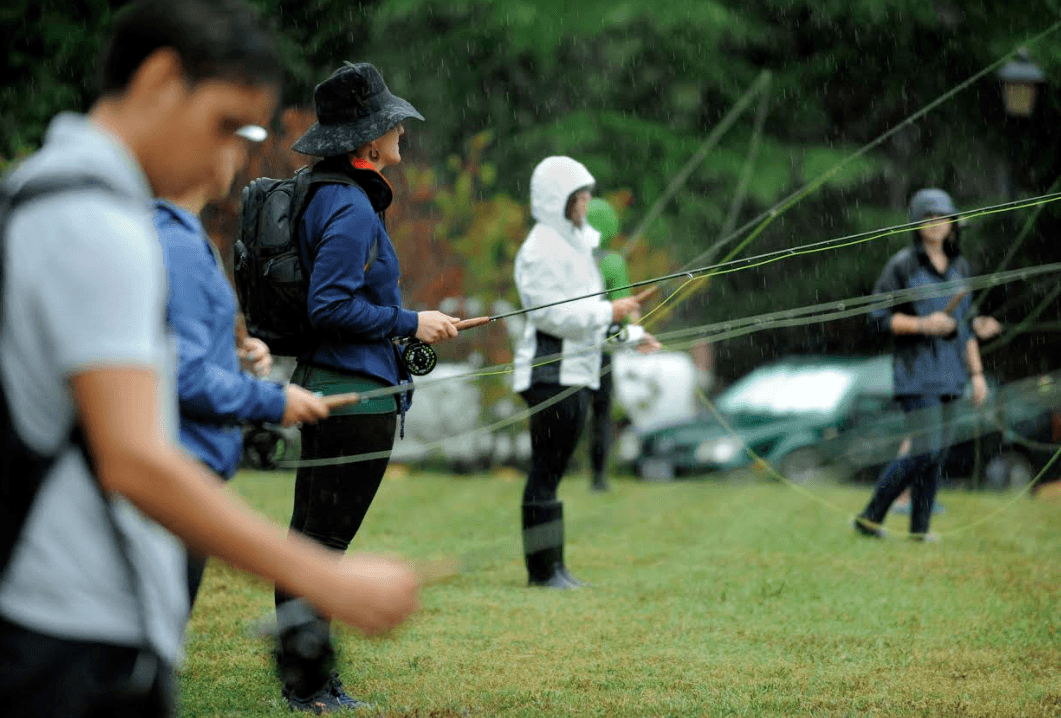Students take up fly-fishing in Ecoliterature class
3 min read
University Relations
By REBECCA MELSON
On Sept. 19, a class full of students lined themselves on Jefferson Square. The rain poured down like an end of summer monsoon. The class of English 303, Ecoliterature, picked up fishing rods instead of pencils. They perfected their casts and tuned into nature.
Jon Pineda, Assistant English Professor and instructor of the new Ecoliterature course, along with two fly fishing instructors from the Orvis sporting goods store, assisted students as they were granted permission to experience something that draws individuals out of the everyday classroom: Fly-fishing.
When I enrolled in Ecoliterature, I had no expectations as to what the class would be about. I did not know that I would be encouraged to surround myself in nature and observe life as it is, or for that matter, how my own life has been intertwined within it. Nor did I expect to be introduced to literature that would inspire my relationship and understanding of the natural world, while simultaneously developing my writing skills.
This class has immersed me in deeper parts of myself, my world and my writing through a variety of medians and perspectives. The relationship that many students and individuals have with our environment can sometimes be almost, generic, as we accept and take nature at face value instead of deeply pondering our relations, extractions and needs from it. The pedagogy presented in this course encourages personal definition and invokes desire to dive deeper.
The course opened up with an observation of DamNation, a 2014 documentary produced by Travis Rummel, in which the history and economical effects of dams were presented. The reality of the American history and obsession with dams was jarring for myself, as I have never pondered the dam before, outside of being in awe as I crossed the Hoover Dam on my way to Las Vegas.
From the current experiences assigned by the class, such as spending time by the river and reflective writing, to engaging with fellow classmates, I am not the only student who has begun to speak the language.
“I really appreciate the ability to read what others have to say, and listen to ways that other people contribute when you are in front of them,” said senior creative writing major Alec Kaloudis. “I hope to take a lot out of this class, and, based on the medium in which the need is, just contribute the way that I can, through literature and creative writing.”
Not only have students been invited to engage in a number of ways with our environment, but the literature of the course deepens a young writer’s literary experience. Amongst the penetrating literature for the course is a book of essays by Amy Leach, “Things That Are,” where students dive deeply into consciousness of the natural world through the brilliance of language.
“Of course if your heart is too fervent, you will become an attractive incinerator, like the Sun, glorious but no pleasure boat. The glory of the Sun is violent and uninflected; its features are all flames and its sounds are all explosions.” writes Leach, inspiring a profundity of thought for readers.
Professor Pineda, when asked what he hoped to result from the Ecoliterature course, expressed his desire to intellectualize the students experience with nature, and allow them to discover the languages of our natural environment while removed from common routine emotion.
“We can appreciate the way we are affected by essays and interrogate it as natural thoughts, while looking at the way we separate nature from ourselves,” Pineda said. “I want students to have a deepened understanding of nature that can move forward in discussion amongst the class and with others. I hope to reduce the distance between the ideal and the real and I expect that we are taking steps close to the ideal.”











